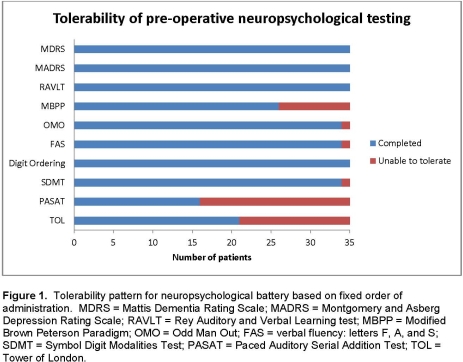Session Information
Date: Monday, June 20, 2016
Session Title: Surgical therapy: Parkinson's disease
Session Time: 12:30pm-2:00pm
Location: Exhibit Hall located in Hall B, Level 2
Objective: We examined tolerability of preoperative neuropsychological testing (the Core Assessment Program for Surgical Interventional Therapies in Parkinson’s disease [CAPSIT-PD] protocol) for DBS.
Background: CAPSIT-PD was published in 1999 with the goal of providing the minimal requirements for a common patient evaluation protocol for surgical interventions, including DBS, in Parkinson’s disease (PD). Factors, such as fatigability, baseline cognitive impairment, duration of testing, and disease duration, may influence neuropsychological performance, but have not fully been explored in the DBS population. We aimed to assess tolerability of the full CAPSIT-PD protocol and examined factors that may influence tolerability,including fatigability, global cognitive function, and depression.
Methods: In this retrospective study, we reviewed preoperative neuropsychological testing results from 35 patients who were scheduled to undergo DBS. We examined the overall tolerability of the full battery and the tolerability of each test. We placed attention on a test’s placement in the fixed order of the battery to measure whether there was a clustering of poorly tolerated tests toward the end of the battery as an indication of fatigue. Spearman rank correlation was used to determine the relationship between tolerability and (1) global cognitive function, (2) depression, and (3) patient-based characteristics.
Results: Fourteen subjects (40%) were able to tolerate the full battery and completed all 10 tests. The domains that were least tolerated pertained to executive function and procedural memory. There was a consistent time-based tolerability pattern that was observed.  There was a significant correlation between tolerability and global cognitive function (q = 0.344; P = 0.043), but not depression (P = 0.197). There was a significant correlation between tolerability and age (rho = 0.491; P = 0.003) and disease duration (rho = 0.442; P = 0.008), but not UPDRS-III scores (P = 0.284).
There was a significant correlation between tolerability and global cognitive function (q = 0.344; P = 0.043), but not depression (P = 0.197). There was a significant correlation between tolerability and age (rho = 0.491; P = 0.003) and disease duration (rho = 0.442; P = 0.008), but not UPDRS-III scores (P = 0.284).
Conclusions: Our results have shown limited tolerability of the full neuropsychological battery as outlined by the CAPSIT-PD protocol. We suggest the consideration of updating the neuropsychological assessment used in the CAPSIT-PD protocol.
To cite this abstract in AMA style:
G.D. Pal, V. Persinger, B. Bernard, B. Ouyang, C. Goetz, L. Verhagen. The core assessment program for surgical interventional therapies in Parkinson’s disease (CAPSIT-PD): Tolerability of preoperative neuropsychological testing for deep brain stimulation in Parkinson’s disease [abstract]. Mov Disord. 2016; 31 (suppl 2). https://www.mdsabstracts.org/abstract/the-core-assessment-program-for-surgical-interventional-therapies-in-parkinsons-disease-capsit-pd-tolerability-of-preoperative-neuropsychological-testing-for-deep-brain-stimulation-in-parkinsons/. Accessed April 20, 2025.« Back to 2016 International Congress
MDS Abstracts - https://www.mdsabstracts.org/abstract/the-core-assessment-program-for-surgical-interventional-therapies-in-parkinsons-disease-capsit-pd-tolerability-of-preoperative-neuropsychological-testing-for-deep-brain-stimulation-in-parkinsons/
